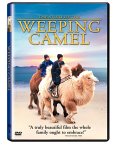| Reviews & Columns |
|
Reviews DVD TV on DVD Blu-ray 4K UHD International DVDs In Theaters Reviews by Studio Video Games Features Collector Series DVDs Easter Egg Database Interviews DVD Talk Radio Feature Articles Columns Anime Talk DVD Savant Horror DVDs The M.O.D. Squad Art House HD Talk Silent DVD
|
DVD Talk Forum |
|
|
| Resources |
|
DVD Price Search Customer Service #'s RCE Info Links |
|
Columns
|
|
|
Story of the Weeping Camel, The
Both in terms of subject matter and the means in which it was made, this German-Mongolian co-production (co-directed by an Italian) recalls Robert Flaherty's great, groundbreaking documentary about Eskimos, Nanook of the North (1922). Weeping Camel was shot in southern Mongolia and follows four generations of nomadic sheep herders living in a scrub country region of the Gobi Desert, in a traditional yurts. Were it not for the occasional glimpse of a plastic fuel oil container or grandfather's modern glasses, the setting might understandably be mistaken for one hundreds of years in the past.
Despite the lack of modern conveniences -- no electricity, no TV, no modern plumbing -- the family seems quite content. They tell stories to one another, play cards and other games, but spend most of their waking hours tending to their sheep, goats, and camels. One of the dromedaries, after two long days of labor, gives birth to a wobbly white colt but immediately and steadfastly rejects it, refusing all attempts by the calf to drink its milk.
After several days of this, the family sends two young sons into town to deliver a note to a local musician, all for a ceremony which will hopefully bring mother and colt together. The trip into town is the documentary's other story, that of the two children's fascination with the rapidly-encroaching modern world, which even in a rural hamlet in far-off Mongolia means satellite television, computer games, and Chips Ahoy! cookies. Like the two boys in Ozu's Ohayo (1958), they're soon lobbying their parents to buy them a TV, despite grandfather's warning that they'd "spend all day watching the glass images."
Like Nanook of the North, The Story of the Weeping Camel apparently films non-actors naturally going about their business some of the time, with other scenes staged for the camera. To what degree the work is fabricated isn't clear -- the DVD itself offers no clues at all.
Not surprisingly, the film works best as a travelogue/cultural document, offering viewers the chance to live with a large Mongolian family for 90 minutes, to find fascination in mankind's universality (grandparents bribing their crying grandchildren with sweets) and incredible diversity (the camel ceremony at the end). It's the kind of documentary with a lot of predictable, picturesque views of setting suns on barren yet quite beautiful landscapes. But there's also long, lingering shots focusing in on little details, like a small whirlwind of sand, or the conch shell -- Conch shell in the Gobi Desert?! Where did they get that? -- used in a religious ceremony.
It's also no surprise that the filmmakers mourn the speed in which 21st century technology (and brand names, like Tide detergent) is changing a way of living that survived quite well without it for centuries, but this is not overstated. After spending the first hour of the film at the sheep farm, the trip into town is a bit of a jolt, like the last third of Dersu Uzala (1975), when the Mongolian hunter is brought to "civilization."
The business with the camels is real enough that younger children might be traumatized by the colt's difficult delivery and by its mother's adamant, rough rejection. But the ending has a certain poetry and undeniable power.
Video & Audio
Frustratingly, The Story of the Weeping Camel is presented in non-anamorphic widescreen, matted to about 1.78:1. The transfer is otherwise excellent; why it was transferred flat is a mystery. Conversely, the audio is given better-than-average treatment, with both 5.1 surround and 2.0 stereo options, with subtitles in English, French, and Spanish. The English subtitling is a bit strange: there's not much dialogue to begin with, yet only about 30-40% of it seems to have been translated. (This may have been true of the theatrical version as well.) In some scenes, characters carry on a conversation but no subtitles appear.
Extra Features
You'd think they'd have at least copied the behind-the-scenes info from its theatrical release press kit, but no: the only supplement here is a paltry photo gallery, of non-existent use or interest. Not an extra but certainly eye-grabbing is the DVD's oddball menu, featuring an animated, lip-smacking, eye-blinking image of the white colt, a goofy design concept better suited to Hawmps! (1978) than this.
Parting Thoughts
The Story of the Weeping Camel is a good film, leisurely-paced, for parents to watch with their children (those old enough to get past the gooey camel birth, that is), and also anyone interested in ordinary daily life in faraway cultures.
Stuart Galbraith IV is a Los Angeles and Kyoto-based film historian whose work includes The Emperor and the Wolf -- The Lives and Films of Akira Kurosawa and Toshiro Mifune. His new book, Cinema Nippon will be published by Taschen in 2005.
|
| Popular Reviews |
| Sponsored Links |
|
|
| Sponsored Links |
|
|
| Release List | Reviews | Shop | Newsletter | Forum | DVD Giveaways | Blu-Ray | Advertise |
|
Copyright 2024 DVDTalk.com All Rights Reserved. Legal Info, Privacy Policy, Terms of Use,
Manage Preferences,
Your Privacy Choices | |||||||














